|
|
|
Sort Order |
|
|
|
Items / Page
|
|
|
|
|
|
|
| Srl | Item |
| 1 |
ID:
126247
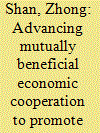

|
|
|
| 2 |
ID:
106766
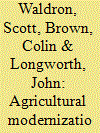

|
|
|
| 3 |
ID:
140746
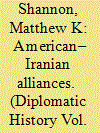

|
|
|
|
|
| Summary/Abstract |
The tension between “modernization” and “rights” defined the relationship between Americans and Iranians from the 1950s through the 1970s. The dynamic interplay between these two transnational currents is best understood through the lens of international education. U.S. policy makers envisaged Western-educated Iranians as the bastion of pro-Americanism required to provide the cultural underpinnings of the Washington–Tehran alliance. But the influx of Iranian students to American campuses globalized U.S. institutions of higher education and, in the process, produced an alternate alliance of Iranian youths and progressive Americans that rejected Shah Mohammad Reza Pahlavi’s authoritarian model of development, called for the realization of human rights in Iran, and revealed the contradictions inherent in a U.S. strategy that promoted student exchange while at the same time supporting the shah as an agent of modernization and anti-Communism.
|
|
|
|
|
|
|
|
|
|
|
|
|
|
|
|
| 4 |
ID:
114263
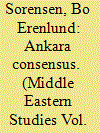

|
|
|
|
|
| Publication |
2012.
|
| Summary/Abstract |
Over the past decade scholarly consensus has moved away from viewing turmoil in Turkey as a product of religious-cultural incompatibility with modernization. Instead, scholars have shown that the rise of an Islamic elite has expanded democracy in Turkey, while often vexing the secularist elite. This article reviews the most important of the new scholarship, but criticizes it for inheriting the assumption that all events in Turkey somehow hinge upon Islamist-secularist antagonism. Alternatively, insights from sociology are employed to argue that domestic Turkish discord is intimately related to industrialization and democratization, and that excessive attention to supposedly religious conflict blinds much contemporary scholarship to the intolerant Sunni-Turkish nationalism cultivated by the Turkish state.
|
|
|
|
|
|
|
|
|
|
|
|
|
|
|
|
| 5 |
ID:
100322
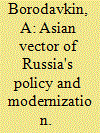

|
|
|
|
|
| Publication |
2010.
|
| Summary/Abstract |
International Affairs": We all know that the APR is developing into another power center as a hub of global economic development with a much greater impact on global politics. What are the main factors behinds its balanced development and what is Russia's role in these processes?
Aleksey Borodavkin, Deputy Foreign Minister of Russia: In recent years, the center of global economic development and political interaction has shifted to the APR where the East Asian export-oriented economies, though hit, together with the rest of the world, by adverse conjuncture, suffered much less of the global financial and economic crisis than Europe and America. The region has retained its role of a driving force of world economy; the national economies are much closer intertwined than before which adds vigor to regional economic integration and stirs up centripetal trends behind the polycentric regional order which is taking shape before our eyes.
Russia, Siberia and the Far East in the first place, should capitalize on its geographical proximity to the rapidly rising region to embrace the innovation development patterns and modernize its economy. The meeting chaired by President Medvedev which took place in Khabarovsk on 2 July 2010 arrived precisely at this conclusion.
From the 18th century onwards, Russia realized itself as a great power stretching from the Atlantic to the Pacific and a progressive civi-lizational project. Our past suggests that we should clarify the priorities to be able to join concrete political and economic projects to the advantage of our people.
|
|
|
|
|
|
|
|
|
|
|
|
|
|
|
|
| 6 |
ID:
169213
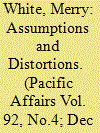

|
|
|
|
|
| Summary/Abstract |
Ronald Dore’s work on education in Japan centred on themes of selection and equality. In his work on Tokugawa education, Dore presaged some of the emphasis he gave in his later work on quality and social and moral content in modern education. The argument of The Diploma Disease concerned the “late development effect” as a tool in understanding the emphasis on qualification and selection that led to Japan’s postwar examination hypertrophy, and in understanding the distortions and inequities that ensued. “Late ascription”—tracking and determining one’s life chances with a single examination—was one such distortion, narrowing the gate to educational and occupational success, belying the notion that Japan demonstrates a pure “meritocracy.”
|
|
|
|
|
|
|
|
|
|
|
|
|
|
|
|
| 7 |
ID:
172114
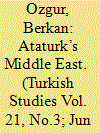

|
|
|
|
|
| Summary/Abstract |
The main argument of this paper is that Turkey had close relations with Middle Eastern states during the Atatürk period, which is contrary to the literature that claims the opposite because of Turkey’s Western-oriented ideology. The article asks why Turkey as a Western-oriented state sought to have close relations with Middle Eastern states. To answer this question, the article uses discourse analysis focusing on Middle Eastern leaders’ visits as represented in Turkish public discourse. Accordingly, it proposes two main answers. Firstly, the paper argues that the new state’s relations with Middle Eastern countries played an important role in legitimation of its Westernization projects in the eyes of its citizens. Secondly, the Turkish state marginalized rival political discourses, mainly Islamism, by proving that even Muslim majority countries wanted to imitate modern Turkey.
|
|
|
|
|
|
|
|
|
|
|
|
|
|
|
|
| 8 |
ID:
187539
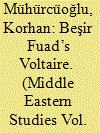

|
|
|
|
|
| Summary/Abstract |
Beşir Fuad (1852?-1887) is an obscure figure among late nineteenth century Ottoman intellectuals known for his materialistic views which were unprecedented under the Hamidian regime (1876-1909) and who shocked his contemporaries by committing suicide at an early age, leaving a note and a letter containing his last impressions and world view. Just months before his suicide, Beşir Fuad published a Voltaire biography in which he commemorates him as an Enlightenment ideal to be emulated in humankind’s struggle against religious intolerance. In this article, Beşir Fuad’s Voltaire (1886) is examined, arguing that the monograph was, though in an embryonic form, an early expression and defence of individual liberty, based on a materialistic world view that aims at demystification of the prevailing customs and morals as irrational and superstitious absurdities to pave the way for a future society in which the individual would be in liberty.
|
|
|
|
|
|
|
|
|
|
|
|
|
|
|
|
| 9 |
ID:
143302
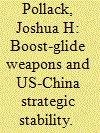

|
|
|
|
|
| Summary/Abstract |
The United States and China are testing boost-glide weapons, long-range strike systems capable of flying at Mach 5 or faster through the upper atmosphere. For the United States, these systems would provide a conventional prompt global strike capability, which, together with US ballistic missile defense programs, Chinese experts regard as a threat to China's ability to conduct nuclear retaliation. This perception is encouraging the Chinese military to modify its nuclear posture in ways that tend to create greater risks for both sides. If China's own boost-glide systems are meant to carry nuclear payloads only, their deployment would not fundamentally alter the current situation between the two states. However, if they were conventionally armed or dual-purpose, or if the United States could not determine the payloads they carried, the deployment of Chinese boost-glide systems could compound problems of strategic stability created by the introduction of ballistic missile defense, antisatellite, and antiship ballistic missile capabilities. If the technical hurdles can be overcome, it may be difficult for the two sides to refrain from these deployments in the absence of strong mutual trust or an established arms-control relationship. New confidence-building measures and expanded mutual transparency are warranted to avoid creating new dangers.
|
|
|
|
|
|
|
|
|
|
|
|
|
|
|
|
| 10 |
ID:
117366
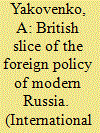

|
|
|
|
|
| Publication |
2012.
|
| Summary/Abstract |
RUSSIA'S FOREIGN POLICY, determined by the President, is carried out on the basis of the Concept of Foreign Policy (last revised: 2008). The concept articulates the following main goals that guide its foreign policy activities, a mega task for which is to aid internal development by foreign policy resources. So it was under Peter I, under Alexander II and so the question stands at present.
|
|
|
|
|
|
|
|
|
|
|
|
|
|
|
|
| 11 |
ID:
112107
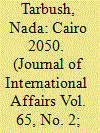

|
|
|
|
|
| Publication |
2012.
|
| Summary/Abstract |
Since the late 1960s, Cairo's urban development has been characterized by a rapid expansion of densely populated informal settlements ('ashwa'iyyat) that now house more than 60 percent of Cairo's population. In 2008, the Egyptian government began promoting Cairo 2050, a grandiose "vision" that aims to counter this phenomenon and transform Cairo into a global city like Paris or Tokyo. This article shows that attempts to redirect Cairo down this path of modernization would fail to resolve the city's urban challenges because they ignore realities on the ground. The article argues that informality and its associated high population density have offered solutions-though they are suboptimal-to resolving Cairo's urban challenges, and that implementing modernity from above will create more problems than solutions.
|
|
|
|
|
|
|
|
|
|
|
|
|
|
|
|
| 12 |
ID:
178785
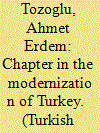

|
|
|
|
|
| Summary/Abstract |
This article examines building of the Seyhan Dam (1953–1956) in Turkey. Both Turkish and American agents played significant roles for planning and implementation of the project during the Cold War era. The 1950s provided necessary conditions in Turkey for the rise of new actors and developments to facilitate transition from limited modernity, which had mostly manifested in urban areas, to a more comprehensive state of modernity extended to rural areas. This extension had irrevocable impacts on the natural landscape as well. By referring to some patterns of modernization, this article posits building of the Seyhan Dam as a significant example to demonstrate how state-led modernization extended its scope by means of taming rivers and opening of plains for agriculture in the Cilician (Çukurova) region from late Ottoman to Republican periods.
|
|
|
|
|
|
|
|
|
|
|
|
|
|
|
|
| 13 |
ID:
091835
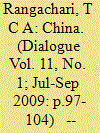

|
|
|
|
|
| Publication |
2009.
|
| Summary/Abstract |
India in the unique situation of having to deal with two contradictory adversarial situations. On the one hand, our smaller neighbours have anxieties about their security given India's much larger size and capabilities.
|
|
|
|
|
|
|
|
|
|
|
|
|
|
|
|
| 14 |
ID:
108824
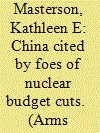

|
|
|
|
|
| Publication |
2011.
|
| Summary/Abstract |
Congress should reconsider proposed cuts to U.S. nuclear weapons spending in light of uncertainties about China's nuclear weapons program, some lawmakers and security analysts are arguing.
Other analysts, however, have said there is little evidence to support some of the more threatening scenarios.
|
|
|
|
|
|
|
|
|
|
|
|
|
|
|
|
| 15 |
ID:
095536
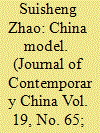

|
|
|
|
|
| Publication |
2010.
|
| Summary/Abstract |
China's economic success under an authoritarian political system in the past 30 years has raised a question about whether the China model will replace the Western model of modernization. This paper seeks answers to this question by exploring to what extent China offers a distinctive model of economic and political development and whether the China model represents a successful co-existence of a free market and an authoritarian state in order to maintain economic growth and political stability, as well as discussing what the appeals and limitations of the China model are.
|
|
|
|
|
|
|
|
|
|
|
|
|
|
|
|
| 16 |
ID:
110056


|
|
|
|
|
| Publication |
2011.
|
| Summary/Abstract |
A comparison of the processes of modernization in China and Russia shows that the key factor of its success is the quality of government: it must have a high degree of viability and at the same time be wholly interested in the far-reaching transformation of society. Such interest is generated when the country encounters critical challenges that threaten its existence, and the ruling class recognizes that the country's fate and their own are indivisible. A visible enhancement of the public's well-being is also a necessary condition of the success of reforms.
|
|
|
|
|
|
|
|
|
|
|
|
|
|
|
|
| 17 |
ID:
089070
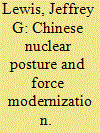

|
|
|
|
|
| Publication |
2009.
|
| Summary/Abstract |
Claims that China is the only nuclear power currently expanding its arsenal fail to take into account the technical, historical, and bureaucratic realities that shaped China's nuclear posture and drive its ongoing modernization. China's strategic modernization is largely a process of deploying new delivery systems, not designing new nuclear warheads; the majority of its new missiles are conventionally armed. Today, China maintains the smallest operationally deployed nuclear force of any of the legally recognized nuclear weapon states, operates under a no-first-use pledge, and keeps its warheads off alert. The modernization of China's delivery systems is the culmination of a decades-long plan to acquire the same capabilities deployed by the other nuclear powers. U.S. concerns about this modernization focus too much on deterring a deliberate Chinese attack and ignore the risk that modernized U.S. and Chinese forces could interact in unexpected ways during a crisis, creating uncontrollable escalatory pressures. To manage this risk, Washington should assure Chinese leaders that it does not seek to deny China's deterrent, in exchange for some understanding that China will not seek numerical parity with U.S. nuclear forces.
|
|
|
|
|
|
|
|
|
|
|
|
|
|
|
|
| 18 |
ID:
102819
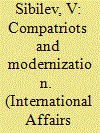

|
|
|
|
|
| Publication |
2011.
|
| Summary/Abstract |
ON 7-8 OCTOBER, 2010, the World Thematic Conference "On the Contribution by Compatriots to Russia's Modernization: Opportunities for the Development of Partner Relations" was held in Moscow under the aegis and with the support of the Government Commission on Compatriots Living Abroad and the Russian Ministry of Foreign Affairs.
More than 140 compatriots from 76 countries of the world, as well as representatives of the federal legislative and executive power bodies, business structures, scientific and medical institutions and associations, publishers, the media, and nongovernmental organizations took part in the conference.
|
|
|
|
|
|
|
|
|
|
|
|
|
|
|
|
| 19 |
ID:
072161
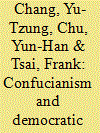

|
|
|
| 20 |
ID:
149172
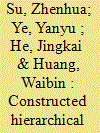

|
|
|
|
|
| Summary/Abstract |
The Chinese government has long enjoyed a higher level of popular trust in its central authority than in its local governments, which means that the Chinese public’s trust in government is hierarchical. While existing research has highlighted hierarchical trust’s role in issue_images_89_4_su-et-al_govt-trust-in-china-ea-image01bolstering the Chinese regime’s rule, the formation mechanism for such trust has not been adequately explored empirically. In this paper, we use data from the China General Social Survey (2010) to explore the formation mechanism of hierarchical government trust and find that economic development, adherence to traditional values, and high frequency of Internet usage all contribute to the decrease of hierarchical government trust. These findings challenge conventional views that cultural traditions and Internet use help sustain hierarchical government trust and show that propaganda is the only variable that sustains the pattern of hierarchical government trust. We further challenge existing literature that views hierarchical government trust as a natural outcome of China’s hierarchical administrative structure and empirically prove that such trust is in fact intentionally constructed by the central government through propaganda campaigns and an institutional design aimed at strengthening the central government’s authority and at guiding people to divert dissent to local governments. Our findings make an important contribution to the dialogue and highlight a new area of authoritarian durability.
|
|
|
|
|
|
|
|
|
|
|
|
|
|
|
|
|
|
|
|
|